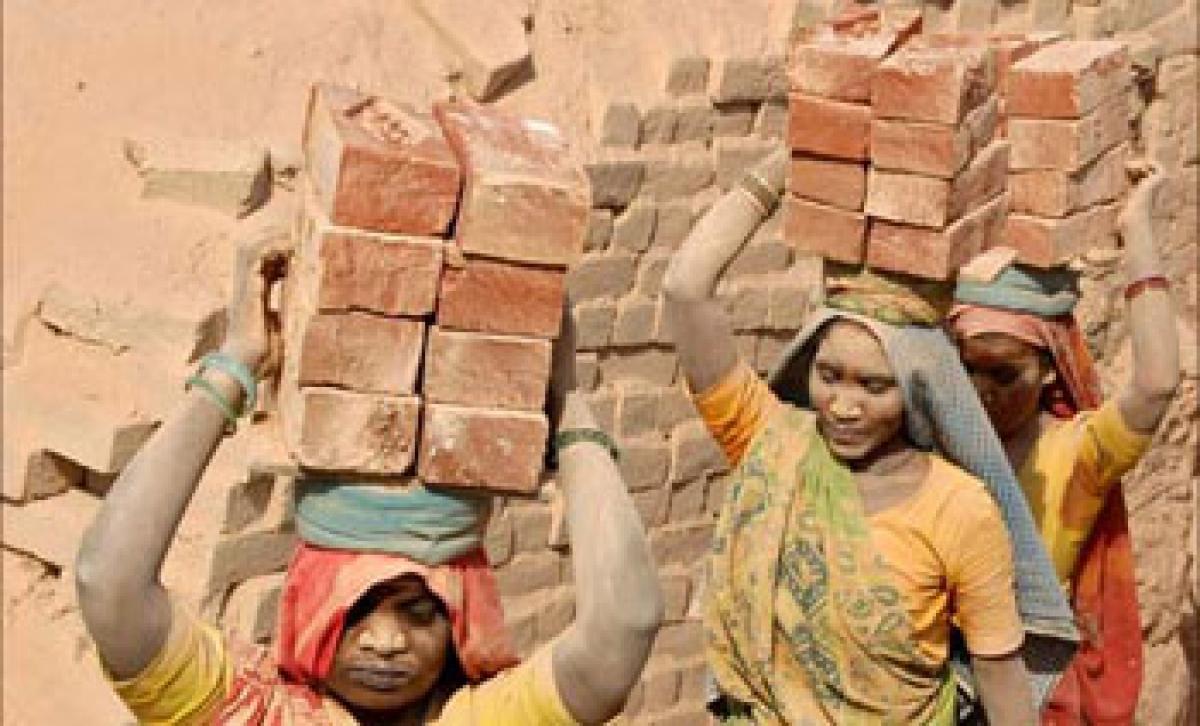Live
- GMR Airports Unveils AI-Powered Digital Twin Platform to Transform Airport Operations
- India poised to become leading maritime player: PM Modi
- Top Causes of Kidney Stones and How to Recognize Silent Symptoms
- India’s renewable energy capacity logs 14.2 pc growth at 213.7 GW
- Winter Session of Odisha Assembly adjourned sine die
- Biden calls Trump's tariff approach 'major mistake'
- After Drama Over Eknath Shinde’s Chief Minister Race, Maharashtra Cabinet Formation Faces New Tensions
- Egyptian FM, Blinken discuss recent developments in Syria
- Iran's supreme leader says Syria's developments result of US-Israeli 'plot'
- Elon Musk to Purchase $100 Million Luxury Mansion Next to Donald Trump's Mar-a-Lago, Report Reveals
Just In

x
Highlights
Every day between 100 and 200 migrant workers from Odisha land in Secunderabad Railway station to work in brick kilns not only on the outskirts of Hyderabad but also in Ranga Reddy and Nalgonda districts.
- Migrant workers from Odisha are packed in like sardines in tiny huts
- They are denied access to medical care and lean water
- The labourers are forced to work between 16 and 18 hours a day
- Even children, as young as six years too, are employed, but they are paid paltry wages
 Hyderabad: Every day between 100 and 200 migrant workers from Odisha land in Secunderabad Railway station to work in brick kilns not only on the outskirts of Hyderabad but also in Ranga Reddy and Nalgonda districts.
Hyderabad: Every day between 100 and 200 migrant workers from Odisha land in Secunderabad Railway station to work in brick kilns not only on the outskirts of Hyderabad but also in Ranga Reddy and Nalgonda districts.
Members of entire families are brought to a small town, called Kantabanji in Bolangir district in Odisha first, and from there they are loaded into unreserved compartments of mainly two trains - Korba-VSKP Link Express and Durg-VSKP passenger. After the migrant workers reach Vishakhapatnam, they are brought to Hyderabad by different modes of transport.
After sipping a hot cup of tea at the Alpha hotel, near the Secunderabad Railway Station, they are packed off to work sites at Qutbullapur, Keesara, Maheshwaram, Patancheru, Jinnaram, Bommalamaram, Turkapally, Peddapalli in Medak, Nalgonda and Karimnagar.
A Krishna, social worker who has been campaigning for better working conditions of brick kiln workers and is one of the members in the Centre for Labour Research and Action, says, “The moment they reach their respective work sites, life changes for the worst. Surviving on broken rice, they are forced to work for 16 to18 hours a day. They are made to live in small huts and they have no access to clean water and medical care.”
Though the Minimum Wage Act makes it mandatory to pay Rs 420 per 1000 bricks, workers are paid between Rs 180 and Rs 250. The Inter-State Migration Act, Bonded Labour Abolition Act are only on paper as brick kiln owners lobby makes sure that social workers and the officials of the Labour Department are kept at bay.
During every season which is between October and June, between 50 and 70 cases of sexual harassment and deaths are reported in both states of Telangana and Andhra Pradesh. Workers are paid Rs 20,000 in advance for six months and brought to work under inhuman conditions. Suresh, a social activist says, “The amount being given in advance to workers remains the same for the last two years.
The poor cannot help accepting whatever little they are given because of drought-like conditions in Odisha. The sardars- labour contractors convince hapless workers, who are burdened with loans from drought prone districts of Koraput, Bolangir and Kalahandi of Odisha, to work in brick kilns.
According to Indian Brick Manufacture Association, approximately one lakh brick kilns are in operation in India which employs over 4 million workers. In Telangana and Andhra Pradesh there are about 30,000 brick kilns. In each brick kiln between 15 and 20 families are working.
Children too forced to work: Children as young as six years are woken up at 3.30 in the morning and forced to work till 9 am. and once again in they are pressed into service at 3 pm. Brick kiln owners do not fix specific wage for children.
Naik, a worker at Dundigal says, “The bricks are laid out in vast tracks of land and if adults walk over them they break, children are used to flip them from one position to another till the bricks become strong.”
According to the Supreme Court order, if there are 30 children are working in an industry, a non-residential bridge course centre should be established under the Sarva Shiksha Abhiyan. Sadly there are not any schools in the 100-and-odd brick kilns in and around Hyderabad or for that matter in other clusters in Telangana and Andhra Pradesh.
By:TP Venu

Next Story
More Stories
ADVERTISEMENT
© 2024 Hyderabad Media House Limited/The Hans India. All rights reserved. Powered by hocalwire.com







